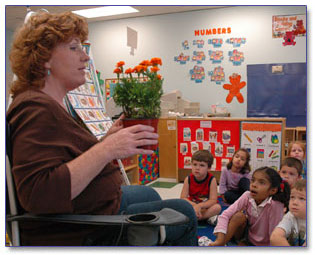  (Page 1 of 2) (Page 1 of 2)
Let’s
look at some key ways of providing positive,
engaging, and playful experiences with books and
print in preschool.
Read-Alouds
for Promoting Motivation and Knowledge about Print
Concepts
Prekindergarten teachers should read with children
every day. Reading rituals should be relaxing,
pleasant, and interactive to promote warm feelings
that linger long after the story is over. Powerful
and successful read-alouds make books available
to children and build their motivation for reading.
Children who have many rich experiences with books
before encountering formal reading instruction
are motivated to learn to read in the early grades.
- What kinds
of books motivate children? Great
books! Take time to preview and carefully select
your books for reading aloud. Be sure the books
you choose will interest children. High-quality
books have a rich
vocabulary, varied sentence structure, and illustrations that are appealing and
attractive to support children’s understanding
of the book. Award-winning books such as the
Caldecott Award winners, the American Library
Association Notable Children's Books, or Children’s
Choice books, are examples of high-quality literature.
Throughout the year, try to include a variety
of books. Include
 alphabet books for teaching letters,
storybooks for developing a sense of story structure,
informational books for developing background
knowledge and motivation, and word-play books
for developing phonological awareness. alphabet books for teaching letters,
storybooks for developing a sense of story structure,
informational books for developing background
knowledge and motivation, and word-play books
for developing phonological awareness.
- Before you begin
reading, introduce the book by providing
some background information so children will
have some idea of what to expect while listening
to the story. You might ask children a question
that helps them relate the story they are about
to hear to their own lives. Look at the cover
of the book and share the names of the author
and illustrator. Invite children to predict
what might happen in the story.
|